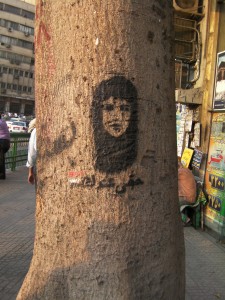 I’ve heard the phrase “The more things change, the more they stay the same” many times since I got to Cairo two days ago. But the hope for a better future that gave rise to the revolution is far from dead.
I’ve heard the phrase “The more things change, the more they stay the same” many times since I got to Cairo two days ago. But the hope for a better future that gave rise to the revolution is far from dead.
Mubarak may be out, but the Egyptian revolution is not over.
I’m here in Cairo meeting with the organizers and activists who were instrumental in Mubarak’s overthrow along with several other organizers and activists from North America. We’re here as part of an Organizers Forum, and we’re all eager to learn from the people who were instrumental in the Egyptian revolution. What I’ve learned so far is that many Egyptians are frustrated because several Mubarak cronies are still in power and things are not changing as quickly as they’d hoped. But their determination and passion is unwavering, and infinitely inspiring.
Yesterday we went to a demonstration by medical technicians outside of the Ministry of Health. Police and soldiers stood by, but did nothing to disrupt the protest or disperse the crowd. Under Mubarak this never would have happened. The protest would have been allowed to happen, more than likely, so that the Mubarak regime could easily observe who was daring to stand up and demand change. Then the police would have cordoned off the protesters, squeezed them into as small a space as possible, and arrested them one by one. But that didn’t happen to these protesters yesterday. It felt like we were really watching a democracy being born.
We’ve met with many of the folks who were in Tahrir Square organizing the occupation that lasted 18 days and led to Mubarak finally stepping down. We’ve met many of the organizers who laid the groundwork for that massive uprising. We’ve even met one of the original three admins of the “We Are All Khaled Said” Facebook page that was the key organizing tool they used to evade state censors and coordinate the revolution. The stories they’ve told have been both heartbreaking, incredibly moving and, above all, inspiring. I’m going to tell as many of them as I can in the next week.
My main takeaway thus far: Despite what you may read in the US media, this was not a revolution led by members of any one religious group. Nor is it a foregone conclusion that the Egyptian government that will ultimately emerge is going to be dominated by the military. This was a genuine uprising by people, predominantly young people, who first and foremost want to be identified as Egyptians, people who demand dignity and democracy for themselves and future generations of Egyptians and are absolutely committed to seeing that the promises of their revolution are fulfilled. I think that point gets lost in the noise and misinformation all too often.
(Also, I was INSIDE the great pyramid of Giza today. Just saying.)